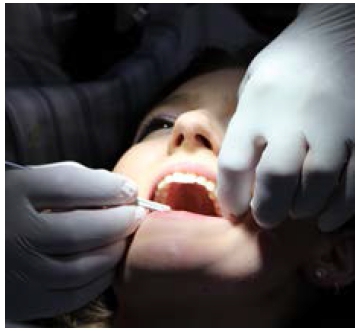Services on Demand
Article
Indicators
Related links
-
 Cited by Google
Cited by Google -
 Similars in Google
Similars in Google
Share
South African Dental Journal
On-line version ISSN 0375-1562
Print version ISSN 0011-8516
S. Afr. dent. j. vol.74 n.9 Johannesburg Oct. 2019
COMMUNIQUE
The South African Dental Association responds to "getting your teeth straightened at a shopping mall" - the dental profession has a warning
Khomi C Makhubele
Chief Executive Officer, SADA

The South African Dental Association (SADA) "strongly discourages" the practice of do-it-yourself or direct-to consumer orthodontics because of the potential for harm to patients.
This year SADA has recognised the need, as South Africa's leading advocate for oral health care, to take steps to educate patients and the public about the potential pitfalls of self-managed or inadequately managed orthodontic treatment.
This policy supports the importance of appropriately trained dental professionals being in charge of diagnosing, planning and treating patients to ensure the safe delivery of appropriate care.
The oversight of treatment coupled with the responsibility of the dental professional for the treatment is fundamental. Furthermore, the patient should have the option to consult with or contact the treating practitioner should the need arise, without any barriers existing to prevent this from happening.
Currently in shopping malls, the public may And shops offering an at-home aligner service which patients can use without ever seeing a dentist or an orthodontist in person - they just take pictures of their teeth, bite down on a mould, and get aligners in the mail.
Alternatively, they might have a scan done in order to have the aligners fabricated. It is also important who decides and approves the final treatment plan and whether or not there is continued monitoring during the course of treatment, as well as recourse and access to the treating practitioner.
With conventional aligner therapy, the practitioner takes the records and then instructs and designs the treatment in conjunction with the company. Aligners are only fabricated once the practitioner has approved the plan.
This is not always the case with some of the companies where the aligners are fabricated after a setup by a software company which is on occasions outside of the country. This in itself may violate certain regulations.
The Association "believes that supervision by a HPCSA registered dentist or specialist is necessary for all phases of orthodontic treatment including oral examinations, periodontal examinations, radiographic examinations, study models or scans of the mouth, treatment planning and prescriptions, periodic progress assessments and final assessments with stabilizing measures."
The lack of one-on-one professional care can often lead to unsatisfactory results. Dentists and orthodontists, on the other hand, are trained professionals who can treat teeth effectively and safely.
While dental care and specialty treatments may seem expensive, the consequences of low-cost, unsuper-vised dental solutions may cost more in the long run. The damage can be "irreparable" if not done correctly, and may lead to loss of teeth and supporting bone.
Moving teeth is a medical procedure and needs personal supervision by an orthodontist or the dentist. Please be wary of any suggestions to move teeth with rubber bands, dental floss or other objects ordered on the Internet.
Moving teeth without a thorough examination of the overall health of the teeth and gums could result in the permanent loss of teeth, which may result in expensive and lifelong dental problems.
The South African Dental Association (SADA) has filed a complaint with the Health Professions Council of South Africa (HPCSA) raising concerns over aspects of marketing and direct-to-consumer sales of plastic teeth aligners. The ruling of the regulator in this regard is presently awaited.

It was reported to the Regulator that these direct-to-consumer suppliers who were taking digital scans of a patient's mouth for the purpose of having a dentist or orthodontist approve of a treatment plan being formulated overseas for correcting a malposition of the patient's teeth fell squarely within the definition of the practice of dentistry. The patient is then provided with a supply of aligners to wear.
It is also of concern that the business model does not involve establishing or facilitating a dentist-patient relationship between its "affiliated" dentists and its customers. Rather, a customer's legal and commercial relationship is exclusively with the commercial establishment. Members of the public are considered "customers" and not even "patients".
In the United States, the Federal Court recently ruled that an entity's acts of taking digital scans of a patient's mouth for the purpose of having a dentist or orthodontist approve of a treatment plan for correcting a malposition of the patient's teeth falls squarely within the definition of the practice of dentistry.
The American Dental Association (ADA) filed a Citizen Petition with the Food and Drug Administration underscoring concerns about direct-to-consumer orthodontic aligners.
The SADA took these actions out of concern for consumer safety and customer recourse should negative outcomes from this direct to consumer dentistry product occur.
SADA considers it our duty on behalf of the public to make the relevant regulator aware of what is occurring so they can consider whatever actions they deem appropriate. Bottom line - with orthodontics or any dental treatment - it's best to just leave it to the professionals.
For more reference on what the rest of the world thinks about this and what they are doing read more below:
California signs law protecting patients from do-it-yourself orthodontics: http://www.wboc.com/story/41179335/california-gov-gavin-newsom-signs-direct-to-consumer-ortho-patient-protections.
British Orthodontic Society and the Oral Health Foundation announces plans for a national campaign to warn patients about the risks of DIY orthodontics: https://www.nature.com/articles/s41415-019-0871-9?fbclid=IwAR1ZEoEy_Cc07w5QsjB5Wf7hTIGrRR5hxL1iBylEBOCo5Ic Qv3fyOe-85rQ.
Hindenburg Research on SmileClub Direct: https://hindenburgresearch.com/smiledirectclub:-moving-fast-and-breaking-things-in-peoples-mouths/.
Doctors and Consumers file a putative class action against SmileDirectClub: https://www.nashvillepost.com/business/health-care/article/21088962/doctors-consumer-file-class-action-against-smiledirectclub.
Customer complaints about SmileDirectClub: https://www.bloomberg.com/news/articles/2019-08-22/a-tooth-straightening-startup-runs-into-resistance.
University of Utah Health - Don't do Teeth Straightening yourself: https://healthcare.utah.edu/healthfeed/postings/2015/09/091415_diy.braces.php?utm_source=ksl&utm_medium= widget&utm_content=Rumor&utm_campaign=healthfeed.














